HIV Blood Test at HIV Testing Clinic with Fast Results
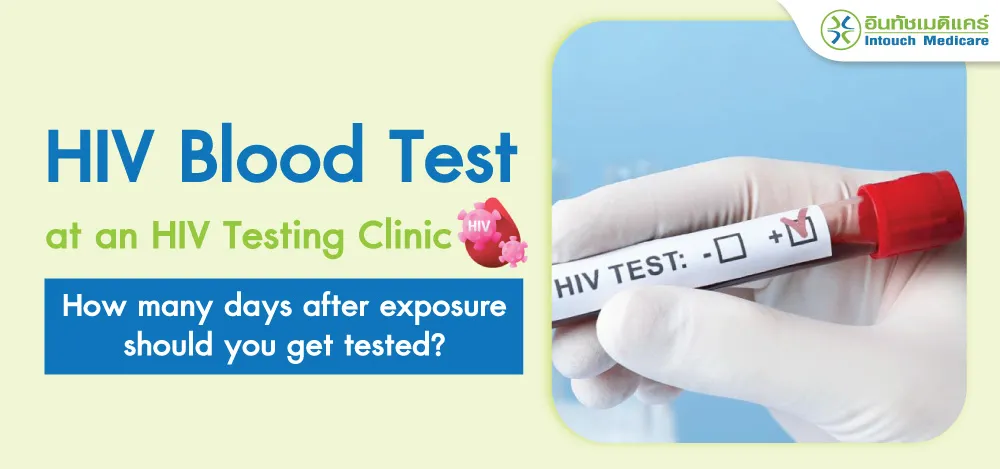
An HIV blood test, or HIV test, is a medical method widely accepted internationally as the most accurate way to detect HIV infection. Although there is currently no vaccine that can directly treat the HIV virus,
early testing helps reduce the severity of the disease and dangerous complications such as AIDS. It also effectively prevents the unintentional spread of the virus to those close to the patient. You can get tested at general hospitals or nearby HIV testing clinics for more convenience and faster results.
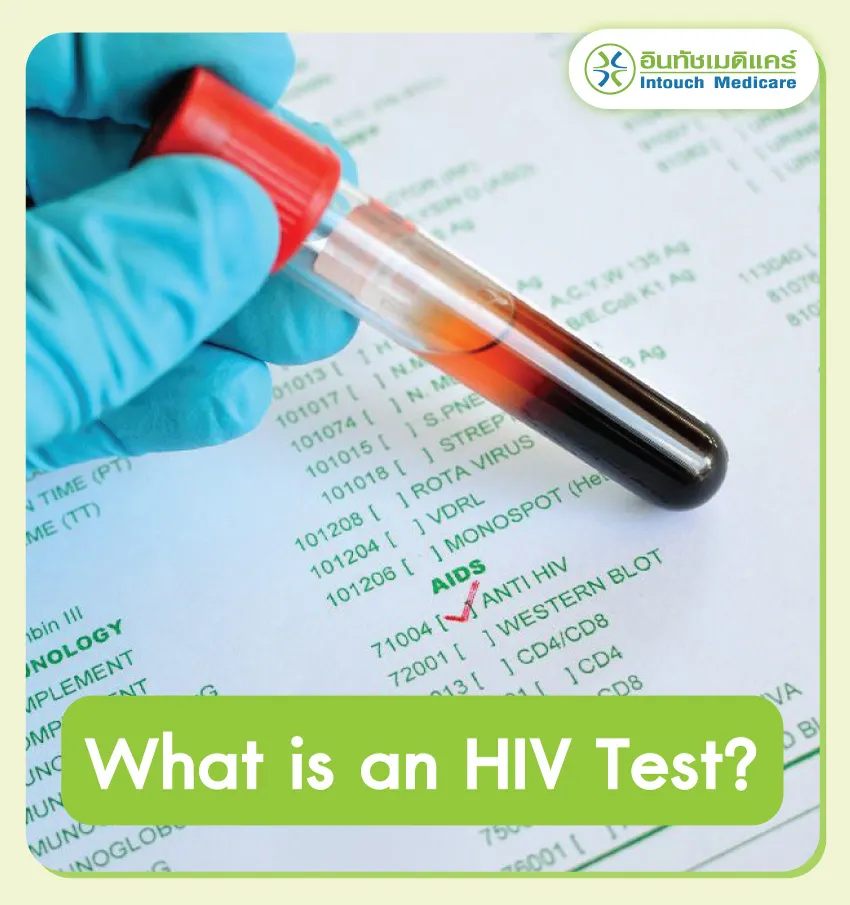
Who should get tested for HIV? How many days after exposure should you get tested? How long do you have to wait for the results? This article from Intouch Medicare provides the answers:
What is an HIV Test?
An HIV test is a medical procedure used to detect HIV infection in the body. There are various laboratory methods and techniques for testing, depending on factors such as time of exposure, accuracy, convenience, and the type of body fluid tested.
HIV is a virus transmitted through sexual contact and blood. HIV can be found in blood and bodily fluids such as semen and vaginal secretions. Currently, blood tests are the most common, and some self-test kits can detect HIV using oral fluids.
How many types of HIV blood tests are there?
There are several laboratory methods for HIV blood testing. Each method is based on detecting the HIV virus directly (HIV Ag), detecting the body's immune response to HIV (AntiHIV), or a combination of both methods (AntiHIV + HIV Ag). The accuracy and the "window period" (the time after exposure during which the virus may not be detected) vary with each method.
After exposure to HIV (such as after sexual contact), the virus gradually multiplies in the body. In the early stages, the viral load in the blood may still be low and undetectable by testing. Therefore, patients should select the appropriate test based on the time of exposure. If the test has a long window period, it may fail to detect the virus even if the patient has been infected.
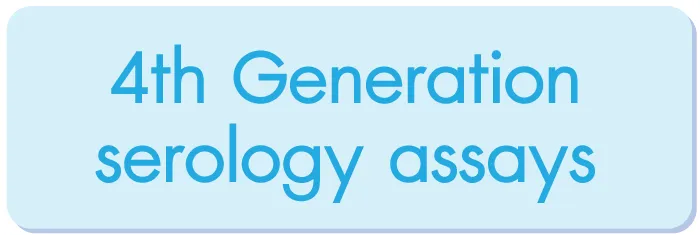
4th Generation serology assays
This is the most commonly used test today. It detects both the body's immune response and the genetic material of HIV (antibodies and antigens) in one test, offering high accuracy and sensitivity (99.5% and 99.8%). ![]()
The window period for this test is short, as it can detect HIV as early as 14 days, or two weeks, after exposure.

3rd Generation serology assays
This test only detects the body's immune response to HIV (antibodies). It is also highly accurate and sensitive (99.5% and 99.5%). ![]() The test can detect HIV as early as 21 days, or three weeks, after exposure.
The test can detect HIV as early as 21 days, or three weeks, after exposure.
This method is also popular because it is easier to access and more affordable than the 4th generation tests, but it has a longer window period.
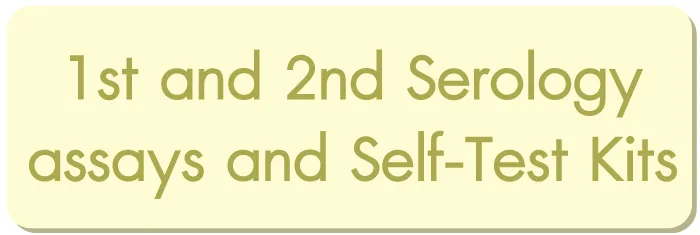
1st and 2nd Serology assays and Self-Test Kits
These tests also detect the body's immune response to HIV (antibodies) but with slightly lower accuracy and sensitivity (around 90-95% and above).![]() These tests are generally used for screening purposes only and cannot be used for a definitive diagnosis of infection. They have a longer window period and can detect HIV 28 days, or four weeks, after exposure, depending on the brand.
These tests are generally used for screening purposes only and cannot be used for a definitive diagnosis of infection. They have a longer window period and can detect HIV 28 days, or four weeks, after exposure, depending on the brand.
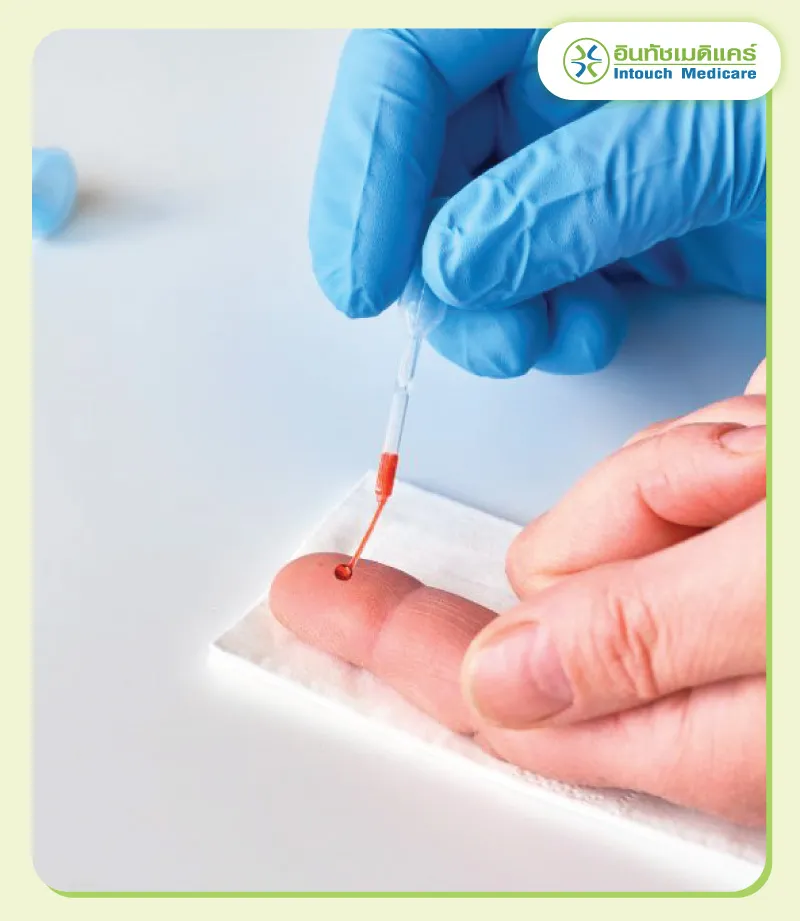
It is a test kit that patients often use for self-testing and is currently available in various brands. The advantage is that it is easily accessible, inexpensive,
and reduces the embarrassment of going to the hospital. It is usually not used in medical facilities.
If the result is positive, the patient needs to confirm the infection at a medical facility again with a third or fourth-generation test kit. If the patient is at high risk of infection, it is recommended to undergo HIV testing with a third or fourth-generation test kit at a medical facility because self-testing may result in errors due to improper testing techniques or sample collection. ![]()
"I have encountered cases where patients initially tested negative with a third-generation test kit. However, due to clear risk exposure in the past 2-3 weeks, they were advised to retest with a fourth-generation test kit on the same day, resulting in a positive diagnosis. This allowed the patient to enter the treatment process more quickly, and no side effects from the HIV infection were found."
- Dr. Nattawadee Sriborisut, Intouch Medicare Clinic -
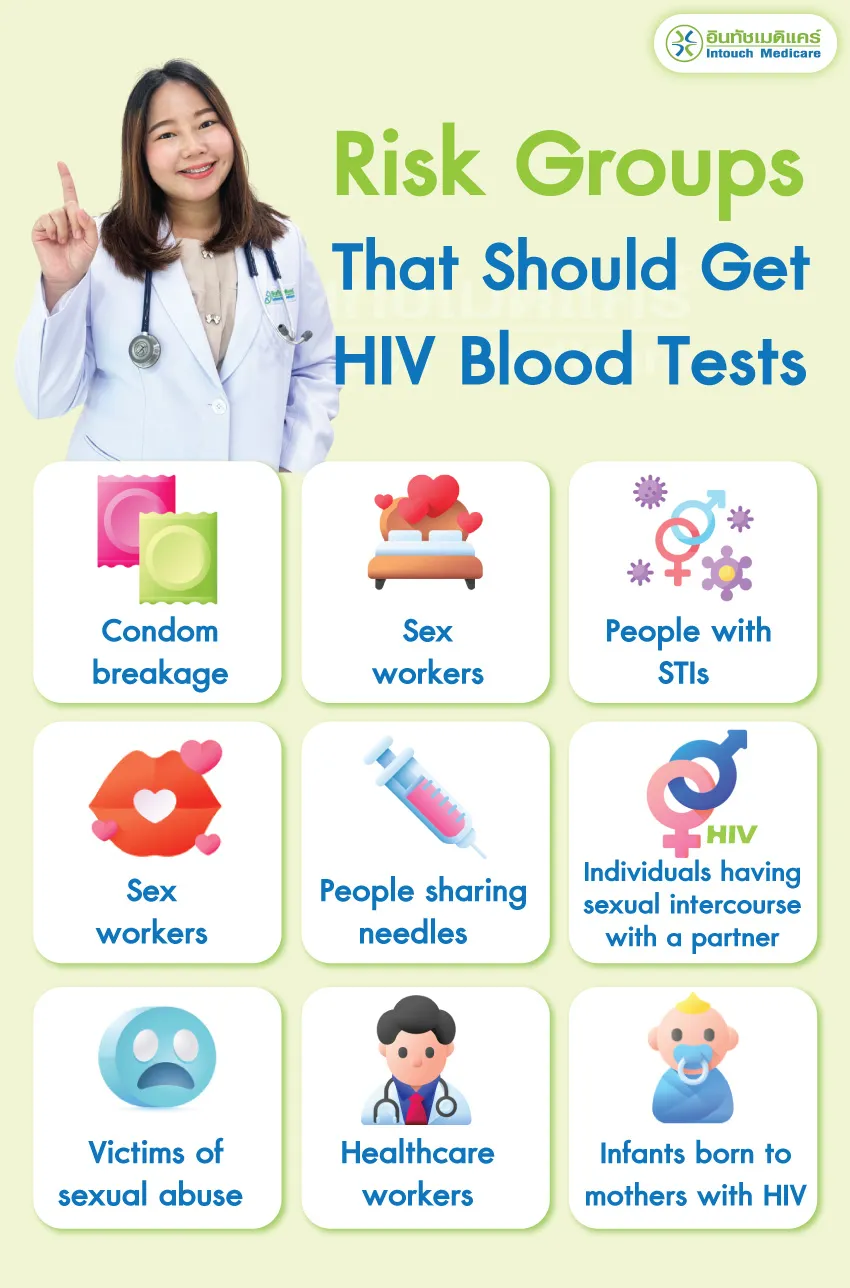
Risk Groups That Should Get HIV Blood Tests
Those who have unprotected sex (without using a condom) or experience condom breakage or tearing.
Those who have a history of frequently changing sexual partners or having multiple partners.
People diagnosed with other sexually transmitted diseases.
Men or women engaged in sex work.
Injecting drug users who are currently injecting, injected within the last 3 months, or have a history of sharing needles or other injecting equipment with others.
Those who have sex with HIV-positive partners.
Those who have been sexually assaulted, had unplanned sex, or cannot remember the event.
Medical professionals or individuals who come into contact with other people's bodily fluids or blood.
Infants born to mothers with HIV.
If you are unsure whether you are at risk, it is recommended to consult a doctor.
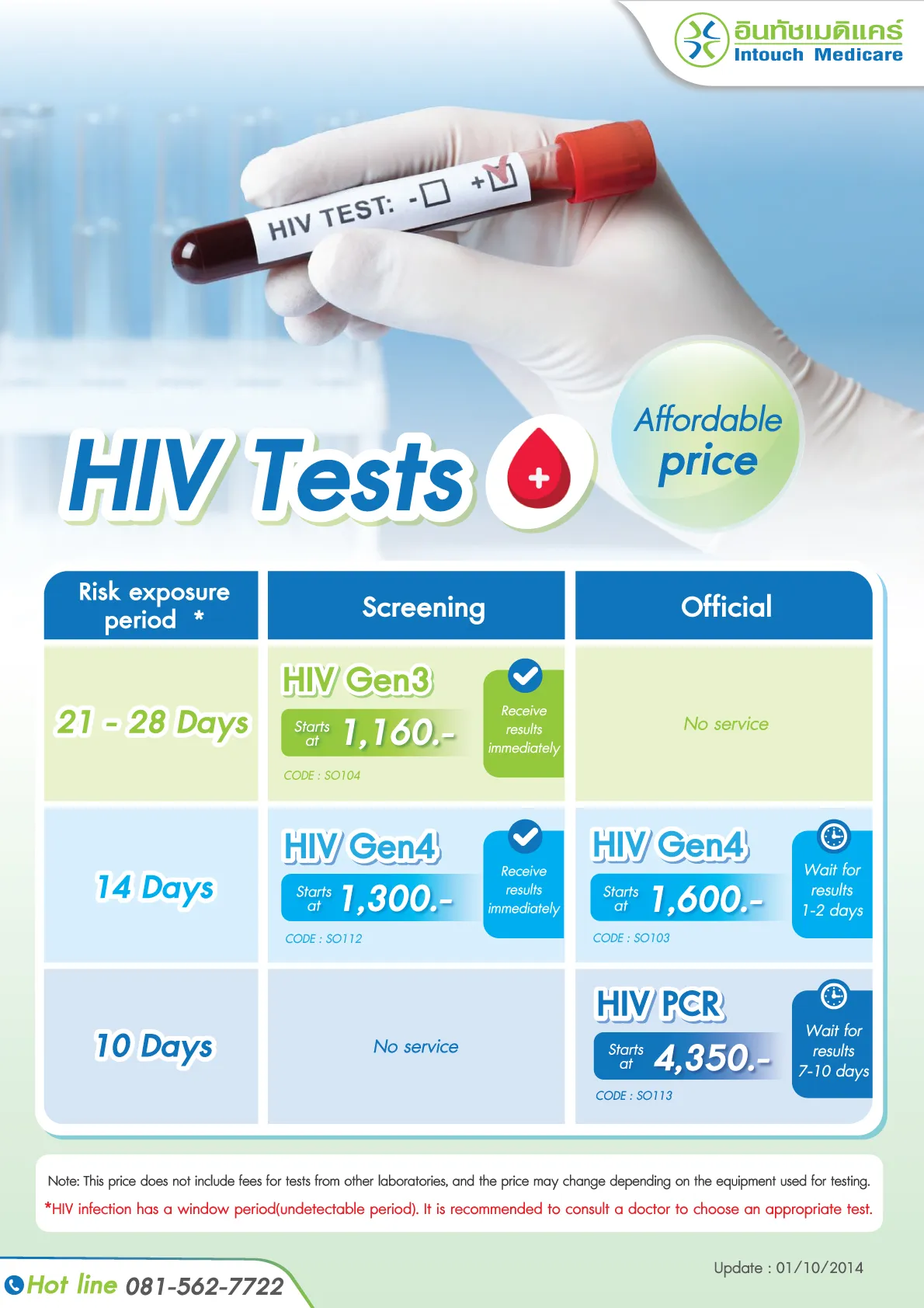
Get HIV blood test at Intouch Medical with fast results. You can rest assured that all personal information is confidential!
Preparation Before Getting Tested for HIV
We will gather essential information for your risk assessment, such as the history of your last sexual contact. It is recommended to get tested at least 14-30 days after potential exposure. Include details about prevention methods, medication history, and any pre-existing conditions so that the doctor can provide appropriate advice and recommend the correct testing method.
When going for a blood test at a hospital or HIV testing clinic, the staff or doctor will take your medical history to assess your risk and provide initial guidance. Afterward, the patient must sign a consent form to initiate the HIV testing process, which takes approximately 30-40 minutes. Following the test, additional advice will be given based on the results.
You can undergo the test without needing to fast or avoid eating and drinking.
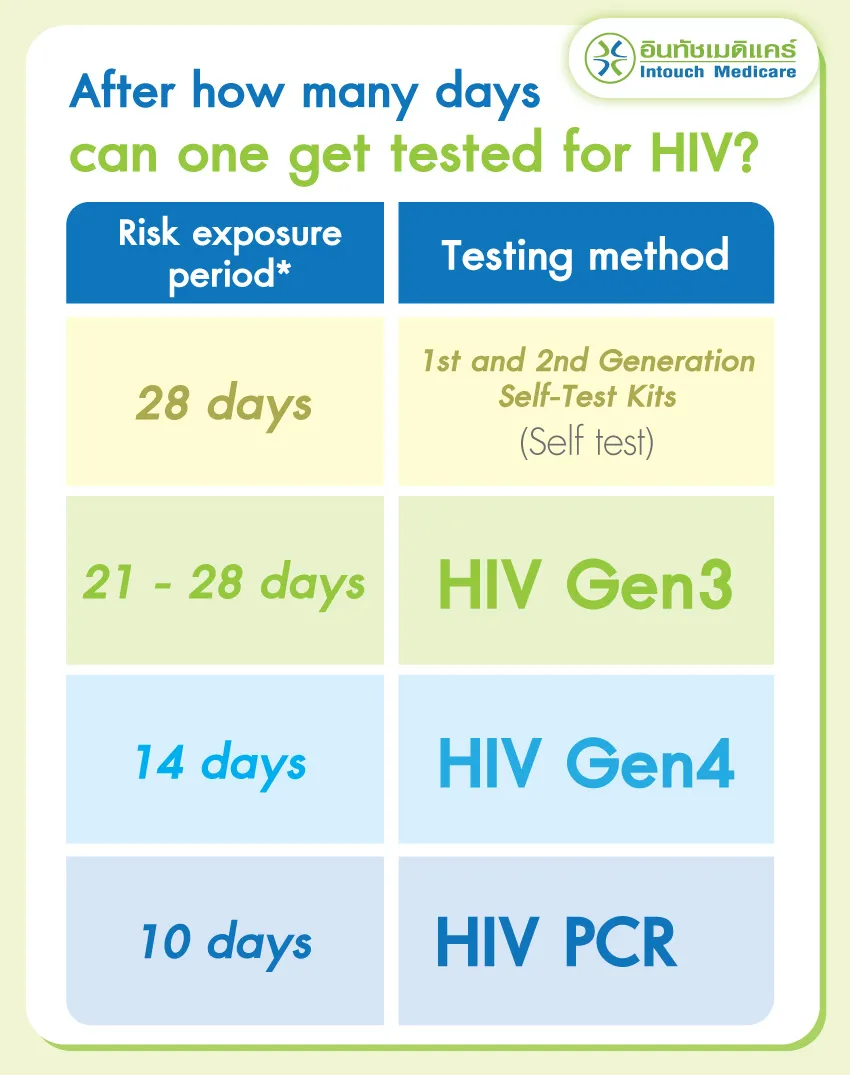
After how many days can one get tested for HIV?
How many days after exposure can you get an HIV test? This is a frequently asked question. Testing can be done as follows:
First and Second Generation Test Kits and Self-Test Kits: Depending on the brand, these tests usually detect the virus 28 days or 4 weeks after exposure.
Third Generation Test Kits (3rd Generation Serology Assays): These can detect the virus 21 days or 3 weeks after exposure.
Fourth Generation Test Kits (4th Generation Serology Assays): These can detect the virus 14 days or 2 weeks after exposure.
HIV Nucleic Acid Testing Assay (NAT): This test can detect the virus as early as 10 days after exposure.
However, some patients may have a longer window period during which the virus is not detectable. Therefore, it is recommended that all patients undergo a follow-up test 1-2 months after the initial exposure to ensure an accurate diagnosis, even if the first test result is negative.
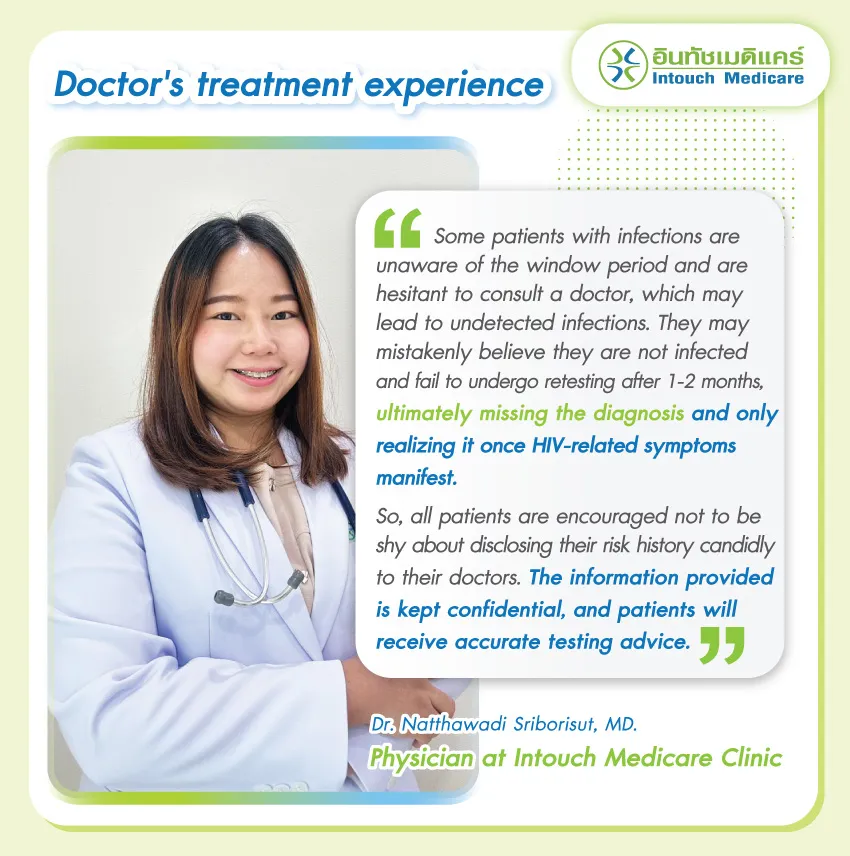
"Some patients with infections are unaware of the window period and are hesitant to consult a doctor, which may lead to undetected infections. They may mistakenly believe they are not infected and fail to undergo retesting after 1-2 months, ultimately missing the diagnosis and only realizing it once HIV-related symptoms manifest.
So, all patients are encouraged not to be shy about disclosing their risk history candidly to their doctors. The information provided is kept confidential, and patients will receive accurate testing advice."![]()
- Dr. Nattawadee Sriborisut, Physician at Intouch Medicare Clinic -
Where can you get an HIV blood test?
For those who suspect they are at risk of HIV infection, HIV blood tests can be conducted at hospitals, medical facilities, and certified anonymous clinics.
It is important to ensure that these clinics are of high quality, have stringent and accurate HIV testing procedures, and prioritize the confidentiality of patient information.
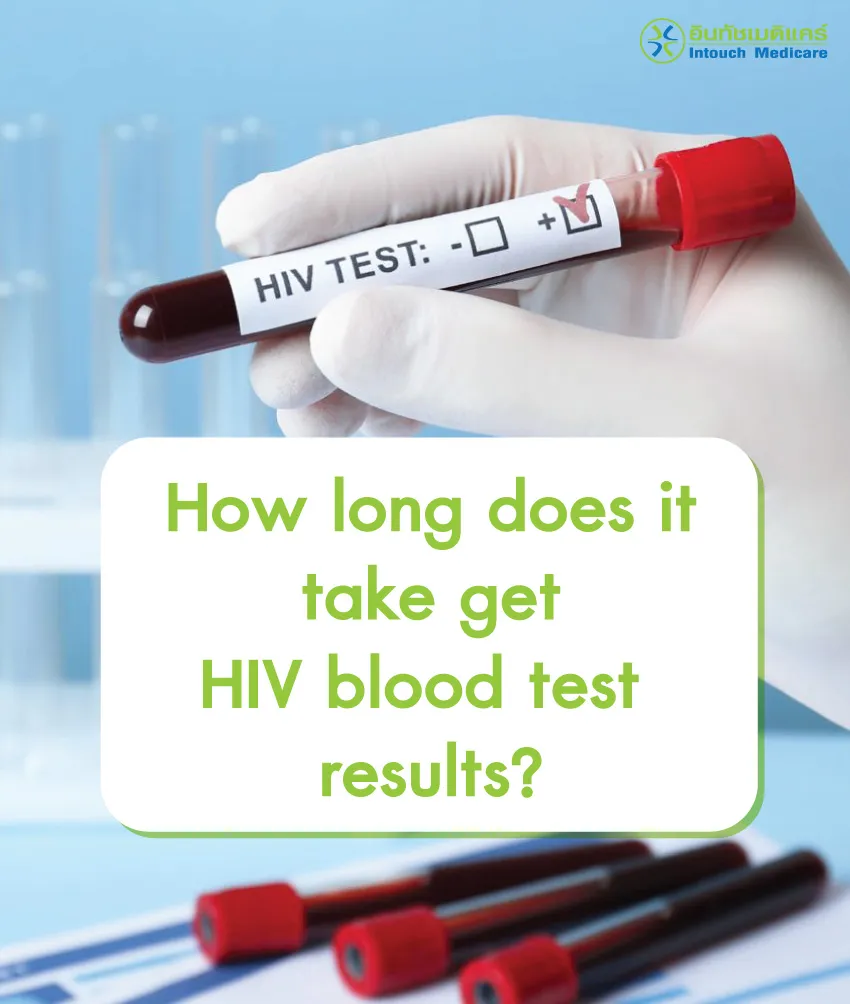
How long does it take to get HIV blood test results?
Nowadays, HIV blood tests do not take long for results. You can get the results within one day, depending on the testing method used.
HIV blood tests using third and fourth-generation test kits can provide results within 30 minutes. NAT (Nucleic Acid Testing) results are usually available in about one day. However, the waiting time for results may vary depending on the procedures of each hospital or clinic.
"If patients are concerned about the window period, it is recommended to get an HIV blood test every 3-6 months, even if there are no symptoms, because HIV testing is now easily accessible and widely available."
- Dr. Nattawadee Sriborisut, Intouch Medicare Clinic -
At Intouch Medicare Clinic, we offer HIV testing, HIV blood tests, and screenings for other sexually transmitted infections. Our staff and specialist medical team ensure all procedures are conducted to high standards, with accuracy and efficiency. If interested, you can search for "Intouch Medicare HIV blood test near me" on Google.
References
Guidelines for HIV Testing, Treatment, and Prevention in Thailand, 2021/2022
CONSOLIDATED GUIDELINES ON HIV TESTING SERVICES 2019 , World Health Organization
Mandell, Douglas, and Bennett’s principles and practice of infectious disease. 9th Edition; 2019
Related Articles
If you have questions, please contact us via
Hot Line 081-562-7722
Composer: Dr. Natthawadi Sriborisut, MD.
Last edited : 28/10/2024
Images may be used without prior permission exclusively for educational or informational purposes, as long as proper credit is given to intouchmedicare.com
